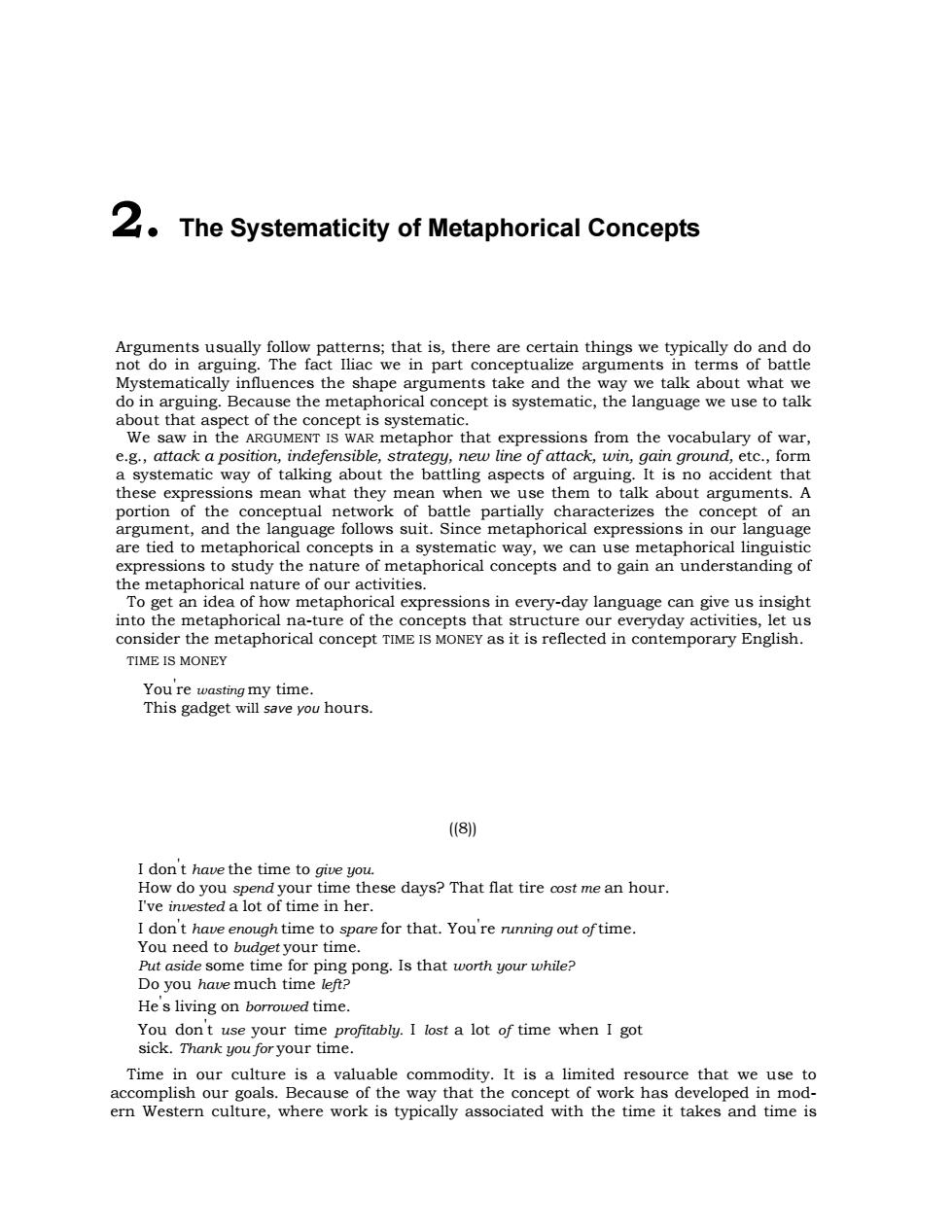正在加载图片...

.The Systematicity of Metaphorical Concepts Arguments usually follow patterns;that is,there are certain things we typically do and do not do in arguing.The fact Iliac we in part conceptualize arguments in terms of battle Mystematically influences the shape arguments take and the way we talk about what we do in arguing.Because the metaphorical concept is systematic,the language we use to talk about that aspect of the concept is systematic. We saw in the ARGUMENT IS WAR metaphor that expressions from the vocabulary of war, e.g.,attack a position,indefensible,strategy,new line of attack,win,gain ground,etc.,form a systematic way of talking about the battling aspects of arguing.It is no accident that these expressions mean what they mean when we use them to talk about arguments.A portion of the conceptual network of battle partially characterizes the concept of an argument,and the language follows suit.Since metaphorical expressions in our language are tied to metaphorical concepts in a systematic way,we can use metaphorical linguistic expressions to study the nature of metaphorical concepts and to gain an understanding of the metaphorical nature of our activities. To get an idea of how metaphorical expressions in every-day language can give us insight into the metaphorical na-ture of the concepts that structure our everyday activities,let us consider the metaphorical concept TIME IS MONEY as it is reflected in contemporary English. TIME IS MONEY You re wasting my time. This gadget will save you hours. (8) I don t have the time to give you. How do you spend your time these days?That flat tire cost me an hour. I've invested a lot of time in her. I don't have enough time to spare for that.You re running out oftime. You need to budget your time. Put aside some time for ping pong.Is that worth your while? Do you have much time left? He s living on borrowed time. You don't use your time profitably.I lost a lot of time when I got sick.Thank you for your time. Time in our culture is a valuable commodity.It is a limited resource that we use to accomplish our goals.Because of the way that the concept of work has developed in mod- ern Western culture,where work is typically associated with the time it takes and time is2. The Systematicity of Metaphorical Concepts Arguments usually follow patterns; that is, there are certain things we typically do and do not do in arguing. The fact Iliac we in part conceptualize arguments in terms of battle Mystematically influences the shape arguments take and the way we talk about what we do in arguing. Because the metaphorical concept is systematic, the language we use to talk about that aspect of the concept is systematic. We saw in the ARGUMENT IS WAR metaphor that expressions from the vocabulary of war, e.g., attack a position, indefensible, strategy, new line of attack, win, gain ground, etc., form a systematic way of talking about the battling aspects of arguing. It is no accident that these expressions mean what they mean when we use them to talk about arguments. A portion of the conceptual network of battle partially characterizes the concept of an argument, and the language follows suit. Since metaphorical expressions in our language are tied to metaphorical concepts in a systematic way, we can use metaphorical linguistic expressions to study the nature of metaphorical concepts and to gain an understanding of the metaphorical nature of our activities. To get an idea of how metaphorical expressions in every-day language can give us insight into the metaphorical na-ture of the concepts that structure our everyday activities, let us consider the metaphorical concept TIME IS MONEY as it is reflected in contemporary English. TIME IS MONEY You' re wasting my time. This gadget will save you hours. ((8)) I don' t have the time to give you. How do you spend your time these days? That flat tire cost me an hour. I've invested a lot of time in her. I don' t have enough time to spare for that. You' re running out of time. You need to budget your time. Put aside some time for ping pong. Is that worth your while? Do you have much time left? He' s living on borrowed time. You don' t use your time profitably. I lost a lot of time when I got sick. Thank you for your time. Time in our culture is a valuable commodity. It is a limited resource that we use to accomplish our goals. Because of the way that the concept of work has developed in modern Western culture, where work is typically associated with the time it takes and time is